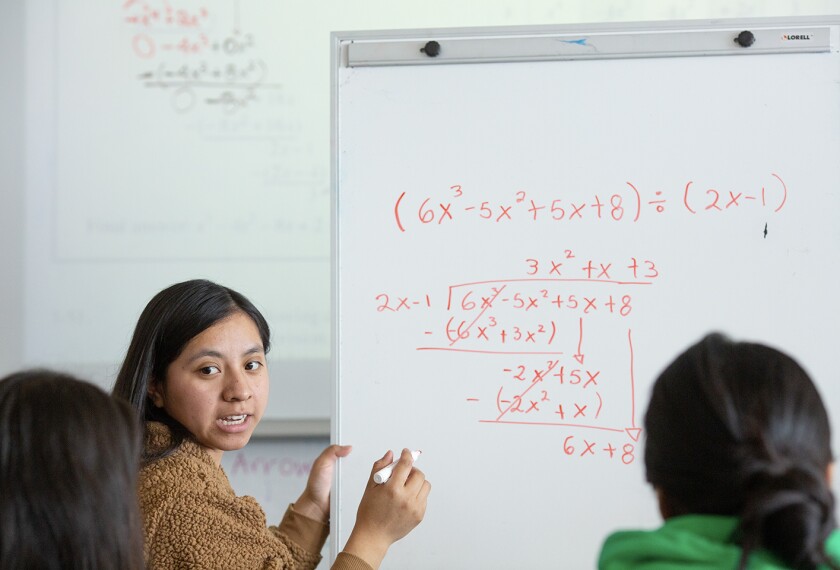The 2022 National Assessment of Educational Progress results got released this week. I cannot stress the level to which I do not care.
Let me be clear. I am a teacher, a career educator. I have been teaching mathematics in Georgia for the last 17 years, at all levels from 8th to 12th grade. I have an undergraduate degree in mathematics and a Ph.D. in math education. I care about my students and I care about their test data. I crave our end-of-the-year state assessments because they give me a snapshot of how good a job I did for my students. We have an in-district math test designed to demonstrate growth, one that we administer three times a year; I eagerly look forward to seeing those results, too.
However, I cannot bring myself to care about these NAEP outcomes. In a normal year? Maybe. This year, our first one back with any semblance of normalcy after three straight years of extreme COVID-19 disruption?
Nah. I just don’t care. Allow me to briefly explain why.
During the past two and half years, COVID-19 has infected close to 100 million people in the United States alone. Over 1 million of those cases resulted in death. Millions were seriously ill and recovered; many were hospitalized. All of this disruption came at great expense to the routines and home lives of children who were forced to live with the effects of pandemic in their households, including the death of close family members. Are we to be surprised that students whose families were struggling with serious health issues and even loss of life had a difficult time taking an optional test tacked on to the end of the second year of disruption? I think not.
In 2020, the United States average household income the previous year, when adjusted by inflation, with lowest-income households hit even harder. Is it unreasonable to think that millions of families undergoing economic hardship in the face of the pandemic were going to experience a shock to their children’s test scores as well?
Critics of the SAT college-entrance exam have long noted that its most predictive power is one of showing that high-income families do well on tests. Couldn’t we expect that an entire nation in economic turmoil would have a dip in NAEP scores?
It is worth pointing out that to varying degrees, depending on district-level decisions, every child in America missed some amount of school. Why shouldn’t we expect to have some dip in the amount of material we learned? I went home in March 2020 and limped virtually through the remainder of the school year. I taught 100 percent virtual in the fall of that year for nine weeks, then did a hybrid for the rest of the school year—half in the room and half on Zoom.
Then for the 2021-22 school year, we were all in the class—in theory. In fact, children were out constantly all year due to illness. None of these plans worked perfectly, and they were all tremendously disruptive. A dip in test scores—noted across the board in all manner of states—was likely inevitable.
A dip in test scores—noted across the board in all manner of states—was likely inevitable.
Also, I have trouble understanding how we can treat last year’s test as comparable to past years’ in any way. Ask any teacher you know: The 2021-22 school year was miserable. Most of our students had been out of the building for 15 months or more, and then they came back, completely bonkers.
Think about the 8th graders—they went home at the end of 6th grade, hit puberty alone in their bedrooms, then came back in the building to see their friends for the first time in over a year. It was everything we could do to keep them marginally focused on school instead of just focused on each other. Then, toward the end of a terrible year, we asked a small selection to go into a room alone and take an optional test that “didn’t count as a grade” but “was important to the school.” Anybody who’s ever worked with children knows how that message can influence scores. And we think this is good data? No way.
Let’s put this score drop into perspective. In 8th grade, math scores dropped from 282 to 274, a decrease of 2.8 percent. 69��ý scores dropped from 263 to 260, or 1.1 percent. In a year where millions of families were upended by job loss, hospitalization, and death due to a global pandemic, can we not put a 1 percent to 3 percent loss in test scores in perspective? Like the economy, why should we expect perpetual growth in our test scores? This year, more than any, we should look at this small dip as “pretty good news.”
Americans have a hard time losing at anything, but it is time to admit that the pandemic beat us. Let’s take these NAEP scores in stride. Yes, all else being equal, we should not expect a significant drop in test scores in any given year. But the past few years have been far from “equal.” Educators are working hard; students are settling in. Children are nothing if not elastic. This cohort will recover if we can intentionally fill in the learning gaps as we move forward. Let’s look at these scores again in a few years before we start freaking out.
Until then, color me unworried and untroubled. This “news” is not news at all.





